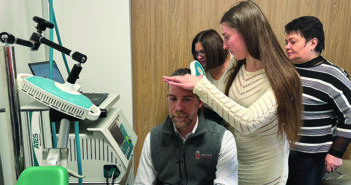In Uganda, poverty is sometimes a patient’s chief complaint.
“She has a positive blanket sign,” the intern said as we arrived at the patient’s bedside.
It was another morning during my internal medicine global health rotation at Mulago Hospital, the largest hospital in Kampala, Uganda. The patients lined the walls in beds about 2 feet apart from each other in the hospital ward, divided by gender and sectioned off loosely based on presenting complaint. After the beds along the perimeter filled, another row of beds appeared down the center, splitting the ward in two; still more patients arranged their own pillows and sheets on the floor when the beds ran out.
Each patient had an attendant, usually a family member, who was responsible for his or her day-to-day care. This included obtaining medications to be administered by the nurse, feeding the patient, and transporting the patient for any care to be performed in another part of the hospital. Among their other responsibilities was providing bedding. Including blankets.
A poor patient often had no attendant. Therefore, no blanket. So when the Ugandan medical intern told me that Sophie had a “positive blanket sign,” she was telling me that the patient was poor.
Sophie was a quiet, 18-year-old woman whose downward gaze and softspoken words conveyed serenity and poise on first meeting, belying the reality of her hopeless expression. Her coarse hair was cropped close to her head and her clavicles protruded from her neckline against her yellowed T-shirt. She told us that she had no family to speak of. She had come to the hospital complaining of a worsening cough. Like many patients at the hospital, she had AIDS. She was not taking antiretroviral therapy and her CD4 count was almost zero. I examined her lungs and contemplated empiric treatment for tuberculosis, another epidemic in this region. Suddenly my eye caught hers.
“Why is her eye deviated like that? Is that new?” I said.
The intern translated Sophie’s Luganda response for me: “That happened three days ago.”
I did a full neurologic exam and quickly discovered that her left arm and leg were completely paralyzed. Did she have a mass in the brain—lymphoma or toxoplasmosis were definitely possibilities in this immunocompromised patient— or had she had a stroke this early in her life? She needed a CT scan of her brain as soon as possible.
However, Sophie couldn’t afford a CT scan. It was one of the studies that the hospital did not provide for free. The hospital could provide certain things like antibiotics and chest x-rays through government and charity funds, but beyond basic services the patient had to pay out of pocket.




